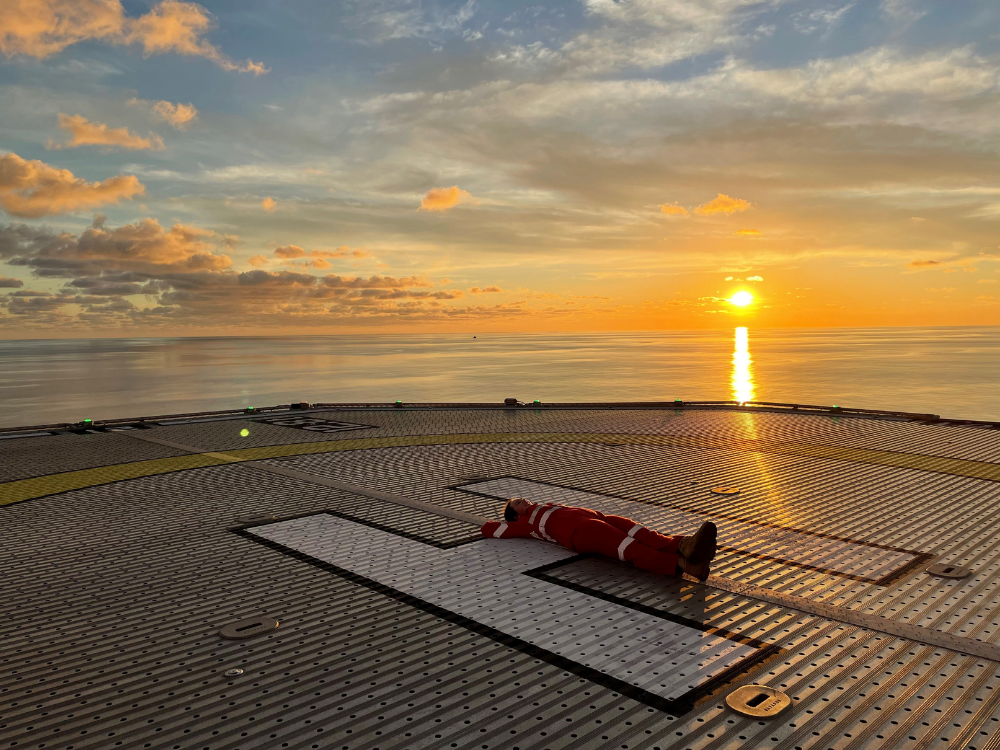Shell
Gabrielle Higgins
What's your job about?
I am working for Shell Australia on their Prelude FLNG asset around 450km off Broome in the middle of the ocean. Prelude is a floating gas facility and produces LNG (household gas), LPG (think BBQ bottles) and condensate (refinery feedstock to make petrol). Prelude receives gas from subsea wells, separates the gas from heavy hydrocarbons (which are sold as condensate), removes gas impurities, and then subsequently separates the gas into different components to be liquefied and sold as LNG and LPG. All our products are collected in tankers and are shipped mainly to Asia.

My role is Offshore Field Engineer. I’m part of the production team, which focuses on optimising our product quality and quantity, ensuring we meet our customer requirements. This position is a FIFO rotational role shared between 3 graduates. A day in the life involves attending pre-start meetings to align production priorities, assisting with alarm management, and getting out in the field to learn how the facility and all its components work. The idea is that we get to see equipment firsthand so that when we return to support remotely, we better understand the process and how to help resolve issues. The Field Engineer works closely with the offshore Operations Engineer, who is our main mentor on how equipment functions. A lot of engineering work is problem solving and involves performing risk assessments and calculations on how we are best to proceed and why it is safe to do so.
What's your background?
I grew up on a merino sheep farm about 3 hours west of Melbourne. I went to a local school until year 8, and then moved to a high school in our regional centre about an hour away. This meant going from 7 classmates to 120 which was a big adjustment. In school I really enjoyed maths and chemistry. I decided to do a broad science degree because I was not convinced on whether I wanted to do pure science or something more practical. After a semester it was pretty clear to me I needed to do something I could see and feel, and that’s how I kind of fell into chemical engineering – it was a bit of an ‘oh that will do’ attitude and I haven’t looked back.
Now that I’m older I realise that life on the farm exposed me to a lot of practical learnings: maintaining farm buildings; fixing fences; ensuring water is pumped across the farm for the sheep; helping with shearing and working in a team. This is pretty relevant to working on an asset where teams maintain and look after equipment, run pumps and ensure everyone is safe onboard. I think somehow, I’ve landed in a career that builds on my practical nature and challenges me mentally, which all adds to the fun of work.
I completed an internship with Shell in Gladstone Qld the summer before my final year. From this, I was successful in getting a graduate role in Perth WA and have been working full-time for almost 2 years.
Could someone with a different background do your job?
Yes, for sure! Shell employs lots of different types of engineers from all over the country. The Field Engineer is a developmental role designed to learn about plant operations and maintenance, so it is applicable to all disciplines. In terms of skills, all you need is a willingness to learn and strong calves to climb all the stairs.
What's the coolest thing about your job?
Getting to see equipment firsthand! There are pipes and valves wider than I am tall. It’s amazing being on site and taking time to remember humans just went about and thought, yeah, I’m going to build a Floating LNG plant. I love working in a team and everyone is eager to help and share ideas. Looking over the side of the ship and seeing sharks/turtles is definitely a highlight. But overall, seeing ice form on cryogenic lines would have to be the coolest of all (pun intended).
What are the limitations of your job?
Something to be aware of in working rotation is length of shifts and time on site. The remoteness of offshore work also means travel to and from site is quite lengthy (2.5h plane flight, overnight in Broome, 2h helicopter flight). It is also very hot!
That being said though, the days are broken up with field time, so they go relatively quickly and there is always that sweet 4- or 5-week break at the end to look forward too.
3 pieces of advice for yourself when you were a student...
- Study what you love, not what job you see at the end. If you love your field things will fall into place.
- Relish those group assignments! I think I was one of the few people who enjoyed group assignments at uni. Take them as an opportunity to see the best in people and get people working on what they’re good at. Most of working life is group work so best to get warmed up to it early.
- Make friends and hang out with peers in your year group. Share frustrations on assignments and celebrate the end of semester together. If you love your cohort, chances are you will like the people you work with.